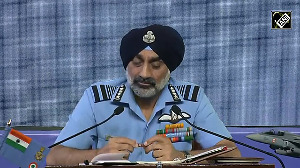The stalled India-United States civilian nuclear agreement could well end up with the next administration both in the US and in India, a former US government official said, adding that a new American President is not likely to scuttle the atomic initiative.
The official also said that the nuclear deal should not become hostage to India's ties with Iran.
"I certainly hope that wouldn't happen," said Bruce Riedel, a former senior official of the National Security Council in-charge of Asia, when asked if a new American President is likely to scuttle the civilian nuclear initiative.
"Sooner or later, the Congress government will force a showdown with the Communists, probably closer to the next scheduled Indian elections in May 2009. This agreement is probably one that is going to slip over into the next Indian administration too," Riedel said.
"This deal is the basis for a strong US-Indian relationship and I support it. There is certainly a possibility that a new administration may try to strengthen the nonproliferation parts of it, and might, particularly if the Democrats are elected, try to revive the Comprehensive Test Ban Treaty," he said.
"But the first step there of course would be for the United States to ratify the CTBT. I don't think we could go to the Indians and ask them to do something that we haven't done so far," he said.
The delay by India on the civilian nuclear deal is entirely due to politics in the governing coalition, maintained Riedel.
"The Congress negotiated the deal and it wants to conclude it. But its junior partner in the coalition, the Communists, opposes the deal for a very simple reason. They recognise that the deal is the pathway by which US-Indian relations are going to get much stronger," Riedel said.
"The Communists are basically opposed to a strong US-Indian strategic partnership and they want to try to scuttle the deal," he added.
"When I was in India a few weeks ago, the government made its determination very clear to push this deal forward and to get its various bits and pieces put together to go to the International Atomic Energy Agency and then take it to the Nuclear Suppliers Group.
On the Iran-Pakistan-India gas pipeline proposal, Riedel said the project was a very complex deal and negotiations were on from a very a long time.
"My own suspicion is that it's still probably years away from being operational. American relations with India should not become a hostage to Indian-Iranian relations."
"India does have a working relationship with Iran. India is the world's second largest Shiite Muslim country. There are almost as many Shiites in India as there are in Iran," Riedel said.
"But India also has a very strong relationship with Israel. Today, India is Israel's number one customer for military exports, and India and Israel have a very close relationship in terms of space activity. India has been a launching point for Israel's most sophisticated spy satellite, which will be launched later this year, and several that are coming up," he pointed out.





